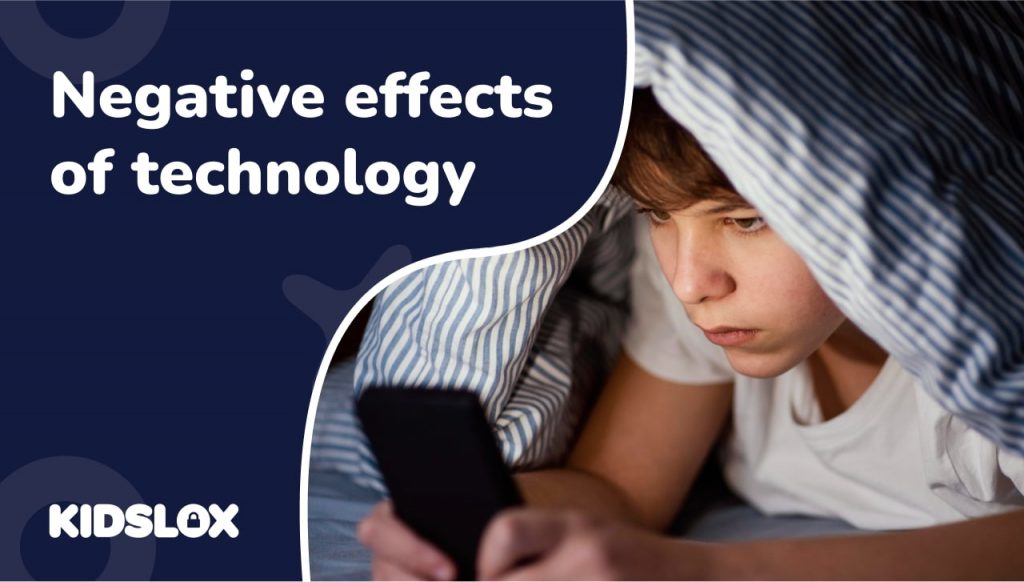Today’s world is crammed with technology. Almost every family owns more than one computer, laptop, smartphone, tablet, television etc. All of these are supposed to make our lives easier. But although originally they’re created to serve humanity faithfully, digital devices have revealed their harmful impact on our lives. Many studies have come to the conclusion that our physical, social, and mental health suffers because of excessive exposure to technology. Let’s discover the negative effects of technology on different aspects of our lives.
Negative effects of technology: what are they?
Social skills
Excessive use of tech solutions is likely to result in poor social skills. Business meetings are held over Zoom and kids chat in messenger rather than calling granny or meeting up with a friend in person. On the face of it, technology appears to create a global network, bringing people together. But in fact, this often replaces real-life communication and results in social isolation. Moreover, strong social bonds are replaced with shallow, “friends” in social networks. As a result, people can feel lonely and depressed. We’ve got into the habit of living in our own world and staring at the device screen even when surrounded by people. When we replace real-life interaction with online communication, we can lose the ability to read social cues like tone of voice, facial expression, body language, and direct wording. On top of all that, violent games and videos can kill empathy and bring destruction into an individual’s life.
Education
The Internet has become a great tool for learning. You can google any information you need rather than spending time in the library to find it. You can attend an online course without leaving home. Yet, the involvement of tech doesn’t guarantee the quality of the education. Children sometimes overuse technology in the classroom which affects the learning process in a negative way. Plagiarism and cheating have increased while analysis and critical thinking skills appear to be in decline. This is putting the thinking abilities of younger generations in jeopardy. Various studies claim that the more students use entertainment technologies like games or social media, the less they perform academically. Instead of reading and doing homework, modern kids indulge in entertainment. A similar situation goes for the Internet: while using the Web to search for information is linked to higher grades, online gaming or socializing is associated with lower exam results. The reason for this is the distraction caused by games, messages, and videos. Young people have a hard time focusing their attention during lessons and resisting impulsive behavior.
Physical effects
Among the most dangerous effects of technology is obesity. Obviously this isn’t a direct effect, yet when your attention is absorbed by a laptop or a tablet, people are often inclined to snack a lot, keep late hours and exercise less. The more time you sit in front of a PC, the more likely you are to suffer from bad blood circulation in your body, not to mention neck and head pain. Moreover, a sedentary lifestyle is the reason why many people have a curved backbone and bad posture. Constant staring at the screen might be the reason for headaches and poor eyesight. Also, while dancing with an iPod in the street may seem cool, it may be harmful to your ears. Regularly listening to loud music in headphones is likely to cause hearing loss and ringing in the ears. Gadgets can also provoke tendonitis in the thumb caused by repeated use of thumbs to push buttons on controllers, or playing too many games.
Privacy and security
When misused, technology can expose you to a number of risks. Kids are especially vulnerable. One in three teenagers reported being victims of cyberbullying. The offenders use text messages, social media, forums and any other messaging platform available to them to reach out to their target. Sexting is another risky behavior teens might be exposed to. 39% of teens surveyed admitted sending sexting messages, and almost half of them had received texts containing nudity. With the huge number of people using the Internet, it’s no surprise that cybercrime is also abundant. Today it’s easier than ever before to find someone’s personal information. The borders of privacy have been blurred significantly via the use of social media, tracking cookies and opaque privacy policies. With a few clicks, it’s not hard to find someone’s Facebook page for example, and then, depending on their settings, to access their pictures, whereabouts, contact information, and more. Information obtained in this way can be used by hackers for a wide range of schemes and scams, leaving internet users vulnerable to phishing, hacking, and virus attacks.
Mental health
One of the quiet, yet surprisingly dramatic impacts technology can have is on the quality and quantity of sleep, which for many has been in decline. The sleep chemical melatonin is influenced by the constant glow from screens. So constant technology use is likely to interfere with your sleep, especially if you’re viewing screens immediately before bed. Even more serious is when people become addicted to technology. While experts argue over whether or not to describe this condition as a true addiction, the opening of clinics specifically addressing addiction to phones, computer games, and other technology highlights the detrimental effect they can have on a person’s health and social life. Addictive behaviors can easily end up destroying social and family bonds.
Among other mental problems caused by computers is a new type of stress called “smartphone stress”. It is caused by notifications (or their absence). Sufferers are in constant anticipation of a message or e-mail. If a person doesn’t get enough attention from someone we love, this can make us feel stressed or even depressed. If we put all our attention into our phones, we can start to rely on their feedback to define our own self worth. A very dangerous position to place oneself in. The risks to our mental health online are many, including information overload, exaggerated reality, information bubbles, and social comparison.
How to reduce negative effects of technology on children
It’s generally not quite possible to remove the technology entirely. Though that does help avoid most of the risks, it discards all that’s good about technology together with the bad. Yet as parents we can moderate the use of gadgets and reduce the negative impact of technology on our children for them to get as much benefit as possible out of the wild, futuristic age we live in. Consider the ideas below:
- Monitor and limit the use of technology. It’s of great importance to know how much your kid uses devices and in what ways. A number of parental control tools provide various restrictions on screen time and content, which can be applied on children’s gadgets. Consider utilizing such software to set boundaries for screen time as well as monitoring and controlling which apps and web content can be viewed.
- Teach responsibility and conscious behavior. Talk to your child about privacy in cyberspace and the potential risks and dangers. Go over specific cases and discuss how to face the challenges online. Explain possible consequences of inappropriate behavior and device misuse.
- Keep up with tech industry spin. Take an interest in current digital trends. In particular, ask your kids about what’s in at the moment. This will help you to recognize and deal with the issues early on and understand what is and isn’t on their radar.
- Find alternatives to technology. Encourage your kid to read books, to get involved in a hobby or a sport, not just online games. Organize a regular family time with no electronic devices. Be an example and remember it’s never too late to bring positive changes to your kid’s life to avoid the negative effects of technology.







